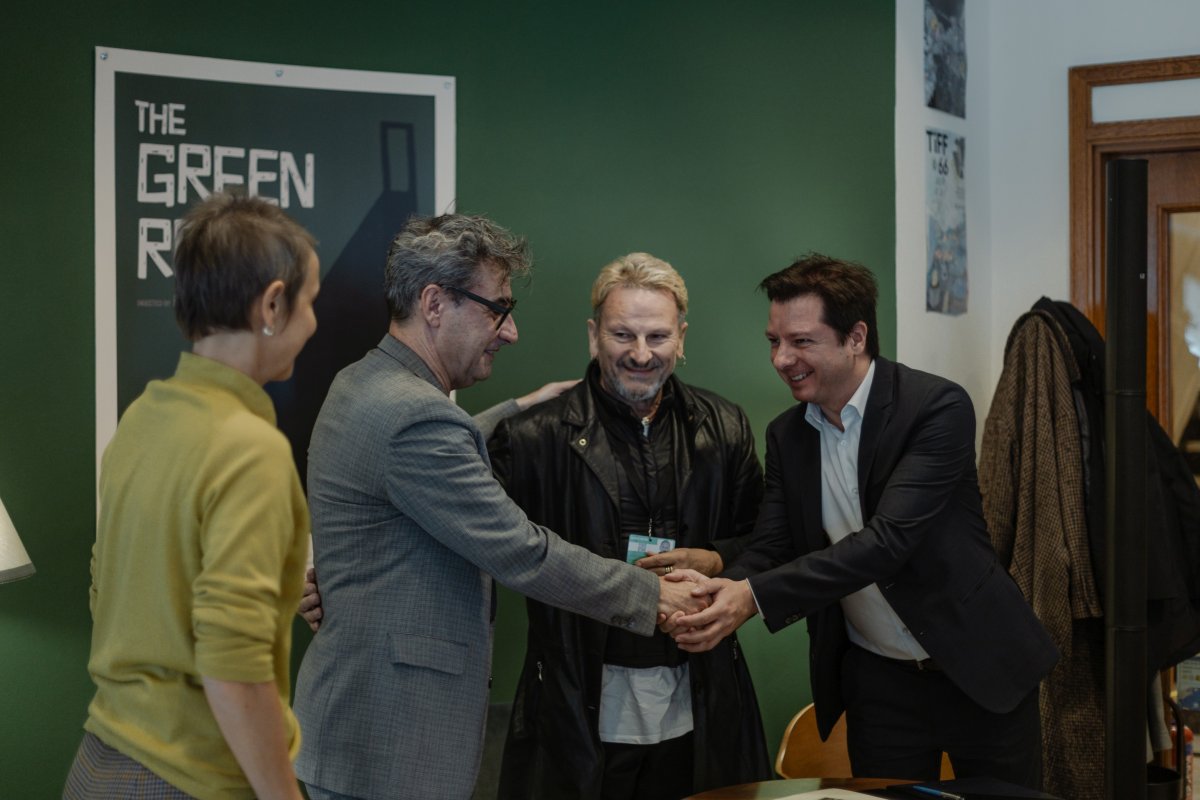As part of the 64th Thessaloniki Film Festival's tribute to Storytelling, script consultant and story editor Ruth Atkinson delivered a masterclass on Wednesday, November 8th, at Pavlos Zannas theatre, titled "Writing from The Inside Out: Finding Your Voice", in collaboration with Discovery Days - Los Angeles Greek Film Festival. Ruth Atkinson sought to explore how to find one's own voice in order to write scripts with a distinct, specific and unique narrative signature.
The event was prefaced by Angeliki Vergou, head of the Festival's Agora. "This masterclass is dedicated to the students of the Film School of the Aristotle University of Thessaloniki. It is a great honor to host this masterclass in collaboration with Discovery Days - Los Angeles Greek Film Festival. Joining us today is Ruth Atkinson, script consultant and story editor."
Ruth Atkinson welcomed the audience and expressed her enthusiasm over her first visit to Greece: "I live in Los Angeles, but I'm from Canada. I recently joined a Facebook group with people who grew up in the same neighborhood as me in Toronto and someone posted a question: "What did you want to do when you were in high school and what did you end up doing with your lives?" This was such an interesting question, too. In high school I wanted to be an artist, a writer and a psychologist. I was always the girl trying to solve her friends' problems. What am I doing now? All of the above. As a script consultant, I work with the screenwriter. I've always been fascinated by the idea of therapy and I'm intrigued by people. I'm enthralled by human behavior. I never went to film school. I wrote, worked with directors and read scripts. I felt a magnetic pull towards writing and interacting with writers. I love talking to writers and exploring the world of their characters," she said.
"Throughout my career I have read more than 3000 scripts. What matters most to me is the emotional reaction I have to the script I just read. How did it make me feel? Did I feel afraid? Did I empathize with something? Am I wracked with anxiety? When I read a script, I get to know the writer. All of our life experiences, everything we've done, nestles in the subconscious. When I read the script, I connect with the writer. Every word has been carefully chosen and arranged. This entire journey has been deliberate and the screenwriter is not even aware of it: he chose to illuminate certain aspects and leave others in the dark. These choices reveal a lot about him to me, these choices emerge in his world for a reason. I find this idea very compelling. Our experiences exist deep within us and appear in our authorial worlds with complete honesty. It's as if we are stripped bare. This collection from which we draw our stories is our inner voice. Most writers have a small pool of ideas that have a tremendous impact within themselves. It's very helpful to be aware of your personal collection," she added.
"Most of the stories have already been told," she continued. "What makes your story unique is primarily the delivery, which constitutes the way you choose to tell your story. Your voice is your heritage and your identity. At times we can't recognize our voice. But the concept of having your own distinct voice is so important, precisely because it makes you unique," she pointed out. She then went on to emphasize the importance of collaborators in the film industry: "You can't make a film on your own. So, to create a film, you need to express your voice with clarity, you need to be precise about your aspirations, you need to be frank regarding your vision. Only then will you attract the right partners."
"By recognizing your inner voice, you understand where to concentrate your energy. Once, while working with a screenwriter who was struggling to finish a piece of his work, I proposed he pen down some ideas as headlines. In a moment, I realized all of his ideas incorporated the notions of redemption and second chances, which of course stemmed from his personal life and his relationship with his father. After we talked about it, he made significant progress and progressed with his writing. It was his inner voice calling him to compose stories of redemption. Once he listened, he succeeded in moving forward," she stated. "I'm drawn to stories of unresolved grief and dysfunctional families because I lost my father when I was 16. I read a lot of material and observed my psychological response. This helped me channel my creativity in a specific direction. Your voice is not restrictive, but dynamic. It changes with your experiences, it evolves, it is not inflexible. Spielberg has made the same film a thousand times and no issue or problem could be found with that fact. Find your own pool of ideas and allow it to provide you with narratives," she further elaborated.
At this point, she offered some practical tips to help those interested in identifying their inner voice. He urged them to write down 5-7 of their favorite films and attempt to find the common denominator, the common threads among them. She also advised the aspiring writers to never self-censor and never judge their own personal tastes. "Observe what you are passionate about and what appeals to you. Screenwriters are perceptive people. Turn the focus of the lens inward, into what I like to call, a radical introspection."
"Notice the endings of movies that move you or scenes from the films which have had a profound impact on you. Be genuine: consider the films you want to see out of personal choice, not the ones your friends invite you to. Notice where you go when you have time off, Check out the photos on your phone. Think of a place, real or imagined, that has had an influence on your life. Think about your relationships, what their nature is, if there is a pattern and if it repeats. Think about a difficult decision you were asked to make recently (often, these moments appear in the script as conflict). What kind of discussions and disagreements have you had with your friends? Pay attention. Writing well means tirelessly exploring your inner world. Being aware of your convictions and your vulnerabilities. Try creating a narrative timeline of your life. Divide it into five-year segments and think about what images come to mind from the last five years. These are the most recent and most defining moments in your life," she mentioned.
She continued by referring to another significant factor. "Notice how your character changes by the end of the film. This is your North Star, your turning point, the change you want to see in the world. Closely observing all these patterns will help you discover your inner voice. This will amplify your stories. Your stories are needed. I wish to encourage you to nurture the spark that burns within you. You are in this room for a reason. Stories are the way we connect and comprehend one another. You should not be ashamed of your stories. What we need is the full spectrum of human experience, we need Barbie and romance. I applaud you for having the courage to seek your inner voice and express yourself," she concluded.















